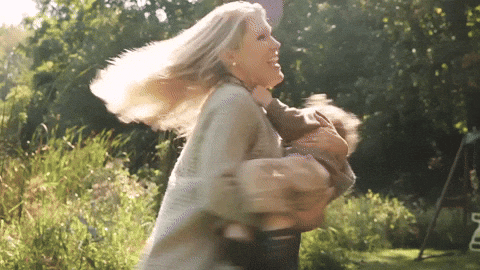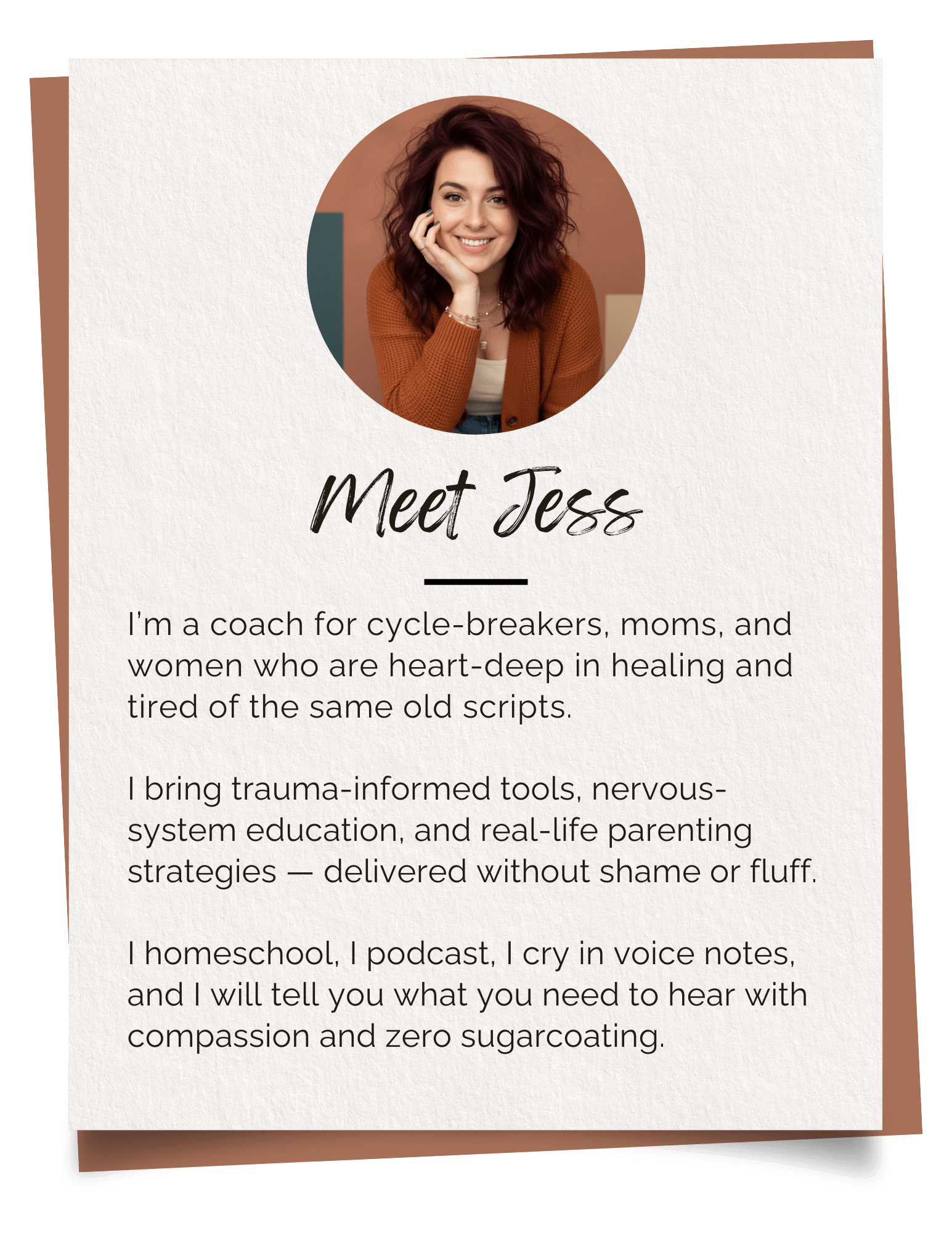You don’t need a better plan—you need a safer state. If you’ve been wondering why your routines, goals, or fresh starts keep falling apart, it might not be about discipline at all. In this episode, we unpack why your nervous system has to feel safe before any strategy can work. Especially for moms navigating burnout and survival mode, we offer a new lens—and real-life regulation tools—to help you stop pushing through and start resetting from the inside out.
Read more...Ditch the vision board because what you truly need is a calming of your frazzled nervous system amidst life’s chaos. This thought-provoking piece delves into why unmet needs persist, intentions falter, and how we might turn the vicious cycle of guilt and burnout into a sustainable practice of self-care and support. With unmet needs manifesting as irritability or anxiety, these insights reveal the importance of understanding and addressing our basic needs, not just surviving but thriving. Learn how to identify your real needs without spiraling into guilt, turn them into actionable boundaries, and set intentions that last even when life gets hectic. Embrace the genuine path of self-support, where your nervous system can finally catch a break and you stop simply white-knuckling your way through each day. Discover the empowering shift from perceived selfishness in self-care to an essential foundation for stability, encouraging not a sweep of change but rather small, repeatable steps towards a balanced and fulfilling life.
Read more...The Messy Truth About Your Burnout
How about we talk about the REAL reason you feel like a total failure every time you try to prioritize yourself: the toxic cultural narrative of "parent's just give their everything." (Especially moms.)
We have been habituated to believe that self-sacrifice is the deepest, truest form of love. Not only is it bullshit, but it leads to feeling like a bad person for wanting to be cared for, too. That fear that you’re juggling 20 flaming batons and if you put a couple out, the whole world will go dark—directly contributes to crippling parental burnout. Just so we are clear here, ONE baton is enough to light things up. The idea that you have to neglect yourself to be a loving mother is flat-out toxic.
I've said it before and I will say it again, Perfection is smoke and mirrors. Telling an overwhelmed mom (especially one juggling ADHD, anxiety, and the trauma of their past) to just do self-care is like telling a drowning person under the ice to simply swim harder. It's useless. Your low motivation and total lack of energy aren't a character flaw or laziness. They're a symptom of burnout.
You know that feeling when you're too stressed to take a break but the weight of the stress is breaking you? That's the Self-Sabotage Loop. You don't have the energy to grab the rope, and that is what's keeping you stuck there.
Brain First: You Can Breathe Your Way Out
When you're in a physiological freak-out—heart racing, jaw clenching, pure panic mode—you absolutely can't think your way out of it. Trying to talk yourself down with positive thoughts when your body feels like it's running from a bear? That’s impossible.
We have to focus on Bottom-Up Regulation first. This means physically calming and grounding your body before you try to change your thoughts. You have to regulate the physical signs of stress—slow the heart rate, deepen the breathing, and relax those tense shoulders. You literally NEED to breathe and move your way out of the crisis before you can engage the thinking part. It's not some woo-woo strategy.
Your commitment to your healing is the commitment to breaking cycles. By choosing to regulate and restore yourself, you are building the inner strength to show up as the rooted, authentic parent and wife you’re determined to be. In turn, you give your kids that beautiful gift.

You’re not imagining it.
The strategies everyone told you would “work” don’t always land. Timeouts. Counting to three. Taking toys away. Even those gentle “talk-it-through” scripts that are supposed to calm things down. They fall flat. Or backfire. Or just...make things worse.
It’s not that you’re doing it wrong. It’s that your child’s brain literally can’t process your words when their nervous system is in fight-or-flight.
And here’s the kicker...neither can yours.
This is why more and more trauma-informed parenting approaches focus on coregulation and not punishment as the foundation for emotional development and behavior change. It’s not fluffy. It’s neuroscience. And it’s something you can start doing today, even if you weren’t raised with this kind of support.
What Actually Happens in a Child’s Brain During a Meltdown
Let’s talk brain science but in plain English.
The part of the brain that helps kids think clearly, reflect, regulate, and make choices? It’s called the prefrontal cortex. And it doesn’t fully mature until your mid to late 20s.
When your child is overwhelmed (screaming, throwing, shutting down), their prefrontal cortex goes offline. Their body is flooded with stress hormones. Their brain is on high alert. Survival mode. And that means they literally can’t access logic, reasoning, or “lessons.”
So when you try to correct or punish during a meltdown, it doesn’t work. Not because your child is defiant. But because their brain is doing exactly what it’s wired to do when it doesn’t feel safe.
Why Timeouts Often Make Things Harder
Let’s be real. Sometimes, we just want space. That’s okay.
But the traditional timeout—“Go to your room and think about what you did”—doesn’t actually help kids learn. In fact, it often leaves them feeling isolated and ashamed while their nervous system is still flooded.
They don’t calm down and reflect. They sit in that dysregulation with no tools and no support. And if you were raised with harsh consequences, silence, or guilt, timeouts might even trigger your own nervous system. Which makes it harder to stay calm, connect, or feel in control.
This is why many parents who are breaking cycles are turning to coregulation.
What Exactly Is Coregulation?
Coregulation is the process of helping your child regulate through your calm presence. You’re not “fixing” their emotions. You’re helping their brain feel safe enough to come back online.
It’s not the same as letting things slide. You’re still holding boundaries. You’re still saying no when needed. But instead of sending them away, you stay connected.
It might look like:
- Sitting nearby and saying, “I see how upset you are. I’m here.”
- Holding a limit with warmth: “I won’t let you hit. Let’s keep our bodies safe.”
- Taking deep breaths out loud so your child can match your rhythm
- Waiting until they’re calm before talking things through
You’re modeling regulation, not demanding it. And over time, your child’s nervous system learns to do the same.
Coregulation Is Especially Powerful for Kids With Trauma or Neurodivergence
If your child has ADHD, sensory processing challenges, anxiety, or a history of trauma, coregulation isn’t just helpful. It’s ESSENTIAL.
These kids experience emotions more intensely. They may have a harder time self-regulating, shifting between tasks, or calming themselves down.
They don’t need stricter consequences. They need nervous system support. And honestly? So do you.
Coregulation supports both of you. When you stay calm with your child, you’re helping them feel safe and helping yourself respond instead of react.
You’re Not “Too Soft” for Parenting This Way
Let’s shut that voice down right now.
There’s nothing “soft” about staying present through a scream-fest or tantrum.
Coregulation takes emotional strength. It takes breaking your own patterns. It takes choosing connection over control—even when you're tired, triggered, and tempted to yell.
And you’re not avoiding boundaries. You’re just delivering them in a way your child’s brain can actually receive.
Example:
- Instead of: “Go to your room until you’re done crying.”
- Try: “You’re feeling a lot right now. I’m going to sit with you. We’ll talk when you're ready.”
That’s not permissive. That’s POWERFUL.
Five Coregulation Moves You Can Practice Today
No scripts. No Pinterest charts. Just real tools you can try, even in the mess.
- Name what you see/hear, not what they “should” feel.
“That was really disappointing.”
“You’re so frustrated you could scream.” - Use your breath as a cue.
Breathe slowly and audibly. It calms your body and signals safety to theirs. - Let silence do some of the work.
You don’t have to explain everything right away. Just being with them can be enough. - Use simple, grounded language.
“I’m right here.”
“We’ll figure this out.”
“It’s okay to feel mad. I’ve got you.” - Repair when needed.
You will lose it sometimes. So will they. Come back and say:
“That was a hard moment. I love you. We’re still okay.”
Gentle Parenting Isn’t About Perfection
This isn’t about always staying calm or never raising your voice. It’s about building a relationship where your child feels safe to fall apart and trusts that you’ll help them come back together.
Some days, you’ll snap. You’ll walk away. You’ll want to scream into a pillow. That doesn’t make you a bad parent. That makes you human.
What matters is returning. Repairing. Choosing connection again. And in doing that, you’re not just helping your child regulate—you’re healing your own nervous system too.

If you’ve ever mentioned “gentle parenting” or “peaceful parenting” at a family dinner, you might have gotten the look. You know the one...eyebrows raised, smirk forming, someone about to say, “Ohhh… so you just let your kids do whatever they want?” If you’re anything like me, you’ve taken a deep breath, sipped your Pepsi (yes, it’s basically my bloodstream), and resisted the urge to whip out a neuroscience textbook at the table.
Let’s clear some things up. Because peaceful parenting is NOT permissive parenting. It’s also not “new-age woo,” “anti-boundary,” or “parenting without discipline.”
It is a research-backed, deeply intentional way to raise kids who are emotionally healthy, respectful, and connected to their parents--not afraid of them.
And today? We’re busting the biggest myths so you can feel confident in this approach (and maybe even convert a few skeptical relatives along the way).
Myth #1: “Gentle parenting means no discipline.”
Truth: Peaceful parenting absolutely includes discipline, it just looks different.
When people hear “gentle” they often imagine a hands-off, “kids are in charge” household. But peaceful parenting isn’t about avoiding discipline; it’s about changing the definition of it.
Discipline comes from the Latin word disciplina, meaning “instruction” or “teaching.”
It’s not about control but it’s about guidance.
It’s not about control but it’s about guidance.
In peaceful parenting, discipline means:
- Setting clear, consistent boundaries
- Following through calmly and firmly
- Teaching your child why certain behaviors aren’t okay
- Modeling the respect you want to see
Example: Instead of yelling, “Stop throwing blocks or you’re going to time out!” You might say, “I can’t let you throw blocks—it’s not safe. You can throw this soft ball instead.” Firm. Kind. Clear. THAT is discipline.
Myth #2: “You’ll raise entitled, spoiled kids.”
Truth: Boundaries are at the heart of peaceful parenting.
I always say boundaries are the deepest form of love. When you set them consistently, you’re telling your child, I care enough to keep you safe, even when you don’t like it.
Spoiling happens when kids get whatever they want, without boundaries or limits. Peaceful parenting does the opposite. it teaches that everyone’s needs matter, and that respect goes both ways.
A home with peaceful parenting has:
- Predictable routines (kids thrive on structure)
- Limits that are explained (“We keep food in the kitchen so the ants don’t get in”)
- Consequences that make sense (if you spill it, we clean it together—not punish you for an accident)
Boundaries create safety. Safety builds trust. Trust creates respect.
Myth #3: “It only works for easy kids.”
Truth: Peaceful parenting is especially powerful for strong-willed kids.
If you have a child who seems to push back on everything, peaceful parenting might feel impossible. But here’s the thing—control-based parenting often fuels that resistance.
Strong-willed kids have a deep need for autonomy. When they feel controlled, they push harder. But when they feel heard and respected, they’re more likely to work with you.
That doesn’t mean you give in, it means you:
- Offer choices within limits (“You can brush your teeth before PJs or after, your choice”)
- Listen before you respond
- Involve them in problem-solving (“How can we make sure the toys get picked up before dinner?”)
Research on attachment shows that when strong-willed kids have a secure base—a parent who is consistent, warm, and firm—they thrive.
Myth #4: “You’re just coddling them.”
Truth: Meeting emotional needs is not the same as giving in.
I get it. Many of us grew up being told to “toughen up” or “stop crying” because our parents thought it would make us resilient. But the science says otherwise.
Kids become resilient when they experience co-regulation—when a calm, safe adult helps them navigate hard emotions. That’s how they learn to self-regulate later.
Coddling is doing everything for your child to avoid discomfort.
Peaceful parenting is sitting with your child in discomfort so they learn to move through it.
When your child is melting down because the blue cup is dirty, you’re not “rewarding bad behavior” by helping them calm down. You’re teaching them that feelings are safe, and that problem-solving is possible.
Myth #5: “It’s too soft—you’ll lose control.”
Truth: Peaceful parenting is leadership, not control.
Think about the best leaders you’ve ever had, were they the ones who barked orders and ruled by fear? Or the ones who respected you, explained expectations, and held you accountable with fairness?
Peaceful parenting is about leading your home with that same energy. You’re not abdicating authority. You’re using it in a way that builds trust instead of fear. Control demands obedience in the moment. Leadership inspires cooperation for a lifetime.
Why Peaceful Parenting Works (The Research Bit)
This isn’t just feel-good woo woo BS, there’s decades of research to back it up:
- Attachment theory shows that secure attachment is built through consistent, warm, responsive care.
- Neuroscience tells us that kids’ brains are still developing emotional regulation skills well into their twenties—our job is to coach them, not crush them.
- Authoritative parenting studies (firm + warm) show better outcomes than authoritarian (strict + harsh) or permissive (lenient + inconsistent) approaches.
In short: Peaceful parenting blends warmth with structure, connection with boundaries AND it works.
So… What Does This Look Like in Real Life?
Here’s a quick cheat sheet:
Peaceful parenting is:
- Clear expectations
- Consistent follow-through
- Empathy in discipline
- Modeling respect
- Prioritizing connection before correction
Peaceful parenting isn’t:
- Letting kids run the show
- Avoiding discipline to “keep the peace”
- Harsh punishments
- Yelling as a primary tool
Your Next Step
If you’ve read this far, you’re probably ready to start shifting your parenting. And here’s the good news: you don’t have to do it perfectly (honestly, you won’t).
But you can start today by choosing one moment to slow down, connect, and lead with respect. That’s peaceful parenting in action.
And if you want guidance, scripts, and tools tailored to your unique kids and your own triggers, that’s exactly what I do as a parenting coach.
📩 [click here] to text me and get clarity around your specific needs. Let’s make your home a place of peace and power.

Let me be real for a second.
There are days where I’m holding back tears over a laundry pile while my kid is literally licking the wall. And in that moment, some part of me still thinks: “I should be more present. I should be more grateful. I should be… more.”
But here's what recent neuroscience is showing--and it changes everything:
Being emotionally present for just 20 minutes a day can literally rewire a child’s brain.
Not in a fluffy, “just breathe and everything’s fine” way. In a real, science-backed, your-kid’s-neurons-are-reshaping-as-we-speak kind of way.
Trauma Isn’t Just Emotiona--It IS Physical HEALTH
New studies are finally confirming what so many trauma-informed parents and coaches have felt in their bones: childhood trauma rewires the brain. Specifically, it triggers neuroinflammation. The kind that impacts memory, mood and stress regulation for life.
That means kids who grow up in chaotic homes, with neglect, abuse, or even chronic emotional stress, may carry the effects deep into adulthood. (Yeah. Same.)
But here’s the silver lining:
Our brains can heal. And connection is a major part of that healing.
Laughter Builds Emotional Resilience--Not Just Memories
Another study from Penn State dropped a truth bomb: Humor used in parenting builds stronger relationships.
Now, I’m not talking about doing TikTok bits or performing for your kid like you're on SNL. I mean lightness. Joking in moments of stress. Smiling at their weird drawings even when you’ve had zero sleep.
The study found that when adults grew up with humorous parents, they were more likely to use humor in their own parenting. And that humor helped buffer stress and build emotional flexibility.
Translation? Goofy dads and messy moms with bad puns might actually be helping their kids develop stronger nervous systems.
Presence Is a Superpower. And It Takes Less Than You Think.
The new Australian documentary SEEN makes a bold claim: Twenty minutes a day of distraction-free connection can rewire your child’s brain.
Twenty minutes.
Twenty minutes.
That’s it.
Featuring neuroplasticity expert Professor Selena Bartlett and parenting educator Maggie Dent, the film shows us what happens when kids feel seen, heard, and safe if even just once a day.
And listen, it’s not about doing crafts with glitter(the freaking herpes of crafts) or reading them ten...thousand books at bedtime. It’s literally just being with them and giving them your undivided attention.
No phone in hand. No multitasking. Just eye contact, warmth, and listening. For 20 minutes.
(That might sound easy. But we both know it takes intention.)
When Laughter and Presence Meet Healing
Here’s what blows my mind: when you combine presence and humor, you’re not just parenting. You are literally reshaping how your child processes the world. It's amazing to think about.
You’re showing them:
- Safety can exist even in the mess.
- Playfulness isn’t childish. It is joy in action.
- They don’t have to perform to be loved.
And the thing is: when you offer those to your kid, you heal parts of you too. You re-parent the part of you that never got that kind of attention or grace.
You know what that’s called?
Yep, Cycle breaking.
Let’s Make This Tangible: Try These 5 Simple Prompts
You don’t need to overhaul your life. Just try one of these this week:
- “What made us laugh today?” (Write it down.)
- During bedtime or dinner, say: “Here’s what I saw you do today that made me proud…”
- Schedule a phone-free 20-minute block. Even if it’s while folding laundry together.
- Let your kid see you be silly. Make a joke. Dance bad on purpose.
- Ask your child: “When do you feel the most seen by me?” (Brace yourself for that one.)
Real Talk Wrap-Up
I can not stress this enough...you do need to be perfect! You do not need to be a therapist. You do not need to have all the tools memorized.
You just need:
- A little awareness
- A moment of presence
- A dash of laughter
That’s it.
You deserve to feel connected, safe, and playful--not just your kids.
So next time you feel that guilt creeping up on you, wondering if you’re doing enough...
Ask yourself: Did I show up authentically today? Did I offer presence or lightness, even once?
That’s the work. That’s the healing.
It's using the capacity you have to do your best.
And it counts. Every. Single. Time.
How I’m learning to set boundaries without losing compassion—or my mind.

So here’s the thing.
I didn’t set out to write about giving. Or honesty. Or boundaries.
But here we are.
Because lately, the Holy Spirit’s been shining a big, blinding spotlight on the way I go through life—my time, my energy, my money, my emotions—and the way I tend to say “yes” when I really mean “I don’t know how to say no without letting someone down.”
And really...that’s not okay.
Not just because it leads to burnout (which it does). But because it’s dishonest and abandoning myself. And Jesus, as it turns out, is big on honesty.
Who knew? ;)
But here's the kicker. It's not just with other people. With yourself, too.
God Loves a Cheerful Giver—Not a Burned-Out, Resentful One
I will admit I have never been great at sticking to reading my Bible. As I age and find myself I anm finding ways to be in scripture that work for me. Such as different translations, digital, hard copy etc. Sometimes it's all of the above. I'm learning to meet myself where I am. But I digress...
So as I move through my time with Jesus I read 2 Corinthians 9:7 and I was a refreshing and grounding wakeup call.

And all I could think was: okay, but… what if I’ve been giving reluctantly and under compulsion for most of my life and calling it “just being a good person”?
What if I’ve been handing out “yes” like candy in an attempt to earn love, stay safe, avoid conflict or prove myself?
Because honestly? A lot of those yes's haven't felt cheerful.
It’s felt like pressure. Obligation. Guilt.
It’s felt like pressure. Obligation. Guilt.
Sometimes it’s even felt like a performance to avoid judgement.
Then Came Matthew 5:37 to Smack Me Gently in the Soul

As I researched what boundaries looked like in terms of scripture, I crossed this one. See, He knows sometimes I need a direct halt to get it, and this is that moment. He’s not yelling. He’s speaking gently. Patient and consistent, like He always is. And when necessary, VERY direct.
Like:
“Sweetness, I see the way you’re trying so hard to do the right thing. But I never asked you to betray yourself in the process.”
“Sweetness, I see the way you’re trying so hard to do the right thing. But I never asked you to betray yourself in the process.”
Because that’s what I’ve been doing. Giving when I didn’t want to. Agreeing to things I didn’t feel peace about. Saying “sure!” while something in me is quietly crumbling.
Not because I’m evil or manipulative or anything dramatic. But because I was never taught that boundaries are love. I was taught that honesty is the best policy but somewhere that got muddied when it came to "being a good person and helping others."
And let's not get it twisted, I am a natural giver. I do love to help others. I'm just not sure what part of that is me and what part is my trauma. So I'm learning to listen to my self and the Holy Spirit more.
You Can't Pour From An Empty Cup
When Paul talks about being a “cheerful giver,” I don’t think he means “put on a smile and give even when you feel like sh*t.”
I think he’s pointing to something deeper.
Something I’m just recently learning how to practice.
Because there’s a difference between generosity and self-abandonment.
There’s a difference between obedience and people-pleasing.
And the difference is joy. Peace. Inner alignment.
Giving should feel like love moving through you. Not like guilt chasing you down.
It should be honest. Aligned. Willing.
It should be honest. Aligned. Willing.
CHEERFUL.
Otherwise, it’s not really a gift. It’s a transaction with emotional strings attached. And let’s be real...we’ve all been on both ends of that and it sucks.
But Sometimes Saying “No” Still Makes My Stomach Turn
I hate unnecessary conflict. Hate letting people down. Hate the sound of disappointment in someone’s voice when I choose myself.
And for a long time, I thought that meant I was selfish. That's what we are often told. ESPECIALLY if you grew up with a narcissistic parent.
But now I think it just means I didn’t feel safe. And safety matters.
Especially when you're unlearning decades of overgiving and honestly a lack of spirituality.
So here’s where I’m at:
I’m practicing telling the truth, even when it’s awkward.
I’m practicing telling the truth, even when it’s awkward.
“No, I can’t commit to that right now.”
“I actually don’t have the capacity.”
“I actually don’t have the capacity.”
"I appreciate you thinking of me for this, I just can't say 'Yes' at this time."
And guess what?
The world keeps spinning!
Some people don’t like it. But the ones who get it? They stay.
And Jesus? He hasn’t left me once.
And Jesus? He hasn’t left me once.
God Doesn’t Want My People-Pleasing
That’s been pretty freeing.
God isn’t grading my heart based on how many times I overcommit or how available I make myself to everyone around me.
If my heart is saying, “This is too much,” but my mouth says, “Sure! Happy to help!”
That’s not obedience. That’s a mask. And masks don't allow for true connection..
That’s not obedience. That’s a mask. And masks don't allow for true connection..
So now, I’m trying to give from truth. Not pressure. Not fear. Not the need to be seen as good or worthy or capable.
Just truth.
Messy Action Is Better Than No Action
Honestly? I’m still in the middle of this. I don’t have a perfect system.
Some days I still say yes out of habit. Some days I over-explain my no like I’m on trial. Some days I give more than I want to and then beat myself up about it. Or get overwhelmed with too much on my plate.
But I’m learning.
To pause.
To check in with the Holy Spirit and my nervous system.
To check in with the Holy Spirit and my nervous system.
Learning to trust that if I say no from a place of love and alignment, my heart is still aligned with God's will.
Because I don’t think He’s standing there with a checklist.
I think He’s sitting next to me, saying, “Hey… we got this. You don’t have to prove anything right now.”
I think He’s sitting next to me, saying, “Hey… we got this. You don’t have to prove anything right now.”
If You’ve Been There Too…
If you’ve been giving until you’re empty, nodding when you want to scream, serving from a place of fear instead of love—I just want you to know:
You’re not the only one. You’re not a bad Christian. You’re not messed up.
You’re a human. That God created and He sees your heart.
Not just what you give, but why you give.
Not just what you say, but what you actually mean.
Not just what you give, but why you give.
Not just what you say, but what you actually mean.
You don’t have to keep bleeding for everyone else to call it "holy".
You can say yes and mean it. You can say no and still be kind.
You can say yes and mean it. You can say no and still be kind.
You can be honest and still be fully within God"s will.
You can be a cheerful giver, because you’ve learned to give from peace. NOT pressure.
I believe THAT is the kind of giving God delights in.
All the love,


Listen, you’re not hopeless. You’re human. You’re learning to know better so you can do better and make it last.
Two things can be true. Mom life can be F*CKING HARD, and also, it can be beneficial for your brain.
There was a study from Rutgers & Yale—37,000 parents, so yeah, huge study—that showed parenting is like brain exercise. It sharpens your brain and keeps it young. We want younger skin, right? What about younger-looking brains?
So when you feel like you're the worst mom because you struggle to keep up or stay calm? Guess what, girlfriend. THAT is you getting better. That’s the awareness kicking in. Growth in progress, right now, in the middle of it.
One of the coolest parts? Dads showed the same benefits. Male and female brains don’t always react the same way but this one lines up. Every diaper change, every bedtime meltdown...it’s not hormonal. It’s BEHAVIORAL. Connecting and adjusting as parents MATTERS.
Every emotional conversation, every “hold it together” moment when everything’s falling apart? That’s shaping and sharpening you.
Stop Shaming Growth And Start Praising The Hard
We throw around stuff like toddler brain, mom brain, baby brain... and there’s always shame underneath, like it’s proof we’re broken. But honestly? We need to stop labeling every hard patch as failure and start seeing it as part of the journey. It’s easy to slap “life’s a journey, not a destination” on a mug—but when are we actually living like that’s true?
"A smooth sea never made a skilled sailor." -Franklin D. Roosevelt
The truth is, we don’t. We default to guilt and shame. Like we’re defeated. For every exhausted parent out there: you are not ruined from pregnancy or parenthood. That spatial forgetfulness, that emotional exhaustion and dysregulation—that could be growth, not failure.
Imagine waking up and thinking: "even if today is hard, I’m coming out stronger".
And if you need facts to back that up, think hindsight bias. There’s a reason we say hindsight’s 20/20. You don’t always see it while you’re in it but that’s exactly how brains work. Every time you come out of a hard moment, you’ve learned something. That is how rewiring happens. That’s brain formation.
And I’ll tell you this for free (thanks Bluey 🤣): every argument you step into with that belief in mind feels less heavy. It’s just more intentional.
Beliefs like this change how we hold ourselves accountable. How we show compassion. How we model parenting to our kids. It shapes how we value our lives, our chaos, our day-to-day.
Like anything, it takes practice. Emotional regulation, connection and consistency are not just goals. They’re mental exercise. Like building up any other muscle.
Think of every hug as a brain curl. Every meltdown as a Russian twist. (Maybe your last Russian twist because, they too, are brutal 🤣.) And all those tone shifts? That’s your distance cardio. Ongoing. And going. And going...
You might get turned off by things that feel fluffy or woo-woo but this is not that.
It’s neuroscience.
And there’s real encouragement in knowing this meets you where you are: completely exhausted but still doing damn well and moving forward!
Feeling like you're channeling your own mom when you least expect it? You're not alone. Breaking generational parenting norms is a beautifully messy journey, one that demands more than just a shift in mindset—it's about rewiring ingrained nervous system responses. While concepts like gentle parenting gain traction, the real challenge lies in the subtle pauses before reaction, the courageous admissions of "I was wrong," and managing those knee-jerk stress responses. It goes beyond theory, delving into the emotional regulation that isn’t just surface-level but nerve-deep. Discover practical insights and strategies for breaking the cycle without burning out. Step into a nurturing change, embracing imperfection while rewiring old patterns one intentional moment at a time.
Read more...


